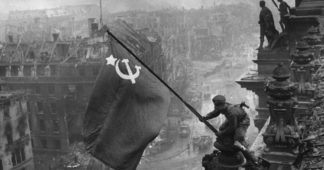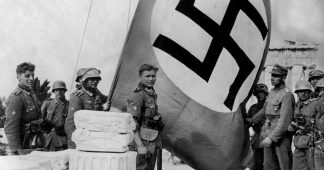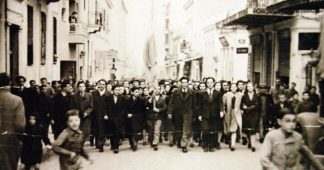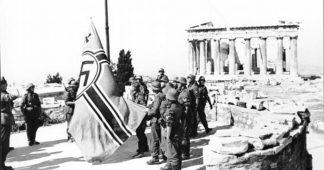How big was Greece’s contribution to the outcome of World War 2?
George Markakis
While other European nations succumbed to the Nazi grip, Greece took a total of 216 days to give in.
Greco-Italian War: October 28 1940 – April 6 1941 [160 days].
War against the Germans: April 6 1941 – June 1 1941 [56 days].
Total: 216 days of Resistance [or 7 months and 4 days].
_ _ _ _ _ _ _ _ _ _ _ _ _ _ _ _ _ _ _ _ _ _ _ _ _ _ _ _ _
And here’s the days of resistance of other countries:
Norway: 61 days.
France: 43 days. [superpower of the time]
Poland: 30 days.
Belgium: 18 days.
Holland: 5 days.
Netherlands: 4 days.
Yugoslavia: 3 days.
Denmark: 0 days. [The Danes surrendered to one of Hitler’s motorcyclists who was delivering to the Danish King Hitler’s request for passage of Nazi troops. The Danish King in a gesture of submission handed over his crown to the motorcyclist so he could take it to Berlin for Hitler].
Czechoslovakia: 0 days.
Luxembourg: 0 days.
But let’s read what the protagonists themselves of this war said and wrote about the Greeks and the Greek resistance.
1) Joseph Stalin, in an open letter read over the air on Radio Moscow short wave on numerous occasions during the war, would say “the Russian people will always be grateful to the Greeks for delaying the German army long enough for winter to set in, thereby giving us the precious time we needed to prepare. We will never forget.”
2) The memoirs of the Russian Field Marshal Zukoff: “If the Russian Peoples succeeded in raising their tired bodies in front of the gates of Moscow, to contain and set back the German torrent, they owe it to the Greek People, that delayed the German Divisions all the time needed. The gigantomachy of Crete, was the climax of the Greek contribution.”
3) Hitler’s Chief of Staff, Field Marshal Wilhelm Keitel stated during the Nuremberg Trials, “the unbelievably strong resistance of the Greeks delayed by two or more vital months the German attack against Russia; if we did not have this long delay, the outcome of the war would have been different in the eastern front and in the war in general.”
4) The words of Hitler himself, spoken in 1944 to the famous German photographer and cinematographist Lenie Riffenstahl, as she relates in her memoirs: “The entrance of Italy to the War was proven catastrophic for us. Had the Italians not attacked Greece and had they not needed our help, the War would have taken a different course. We would have had time to capture Leningrad and Moscow, before the Russian cold weather set in.”
Greece was attacked unprovoked by Italian troops on the 28th of October 1940 and was invaded by the German troops on the 6th April 1941
The Battle of Greece lasted altogether 216 days. This unexpectedly very long and stanch Greek fight back caused international astonishment, general admiration and praise, manifested in many ways. It was something magnificent and rightly considered as a Greek miracle.
Peter Young, in his book “WORLD ALMANAC BOOK OF WW II” reports that the Axis occupied France in 45 days, in spite substantial British military support; Belgium in 18 days; Holland in 5 days, while Denmark submitted in 12 hours and Bulgaria, Rumania and Albania succumbed without a fight.
While only Great Britain and Greece remained practically the only free countries in Europe, small and poor Greece, with material and moral preparation, unity, self-sacrifice, capable political, spiritual, religious and military leadership, fighting alone without substantial allied aid for 160 days, was victorious in her struggle against attacking and many times larger fascist Italy. Later on, when Nazi Germany attacked her too on 6 April 1941, she carried on fighting with the support of meagre British military forces on her mainland, while during the last 11 days she fought together with Commonwealth forces in the defence of the island of Crete. Part of the Greek Armed Forces, including all the remaining from the Battle of Greece Hellenic Navy Warships, together with the King and the under Prime Minister E. Tsouderos Government, moved to Alexandria in Egypt, where they continued fighting the common enemies on the side of the Allies till 1944. However, the Hellenic Merchant Marine was placed by the Greek Goverment at the disposal of the Allies from the very start of WWII on 1 September 1939 and continued serving them to the final WWII end in August 1945.
The failure of the five-month long offensive and the repeated persistent attempts of the fascist Italian Empire to conquer Greece were crowned by the resounding collapse of the largest till then Italian Spring Attack of March 1941. This final offensive was supervised and coordinated by Mussolini himself, who for the purpose went to the Front. Following the failure of this attack too, Mussolini returned beaten and humiliated to Rome.
1) Adolf Hitler himself ordered that no Greek soldier shall be taken prisoner and that those who were, were to be released immediately out of respect of their bravery.
2) Hitler in his speech to the Raichstag on 4 May 1941, which is found recorded in the archives of the Hellenic Radio: “Historic justice compels me to ascertain that of all our opponents, the Greek soldier in particular fought with boldness and highest disrespect for death. Capitulated only when further resistance was impossible and useless.” (my comment: the last sentence is not entirely true).
3) A speech Adolf Hitler made at the Reichstag in 1941 said of the campaign: “It must be said, for the sake of historical truth, that amongst all our opponents, only the Greeks fought with such endless courage and defiance of death.”
4) The diary of Joseph Goebbels 9 April 1941: “I forbid the Press to underestimate the Greeks, to defame them…. The Führer admires the bravery of Greeks.”
The measure of Greek resistance was paid homage and aroused admiration around the world:
1) British Prime Minister Winston Churchill would say “until now we would say that the Greeks fight like heroes. From now on we will say that heroes fight like Greeks.”
2) American President Franklin Roosevelt would say “all free peoples are deeply impressed by the courage and steadfastness of the Greek nation … which is defending itself so valiantly.”
3) The British Minister of Foreign Affairs Lord Halifax, in his speech to the House of Lords, following the capture by the Greeks of the town of Cotitza, from the retreating in Albania Italians: “Great admiration inspires all of us the accomplishment of the Greek valour against an enemy so much more numerous and so much better equipped. These deeds remind us of the trophies of the classical times. Long live Greece!”
Source (1): How the Greeks Saved The World – Greek American Girl
Source (2): Second WW Statistics
Note
The occupation of Greece by German, Italian and Bulgarian forces was not the end of WWII for Greece. Greeks have subsequently organized the biggest resistance movement in all Europe (if we take into account the magnitude of the country), the National Liberation Front (EAM), led by the CP of Greece. EAM was already controlling much of Greek territory in 1944, when the German army has begun to retreat from Greece. After the war British and then Americans intervened militarily to destroy the resistance provoking a bloody civil war. The leadership of the Communist Party refused to organize any effective resistance obeying to Joseph Stalin’s orders. Stalin had agreed with British and Americans to recognize their control of Greece, during the meeting with Churchill in Moscow (October 1944) and the Yalta conference (February 1944).
The Greek people has paid an enormous price for those agreements from which hardly the USSR gained anything!
Dimitris Georgopoulos
We remind our readers that publication of articles on our site does not mean that we agree with what is written. Our policy is to publish anything which we consider of interest, so as to assist our readers in forming their opinions. Sometimes we even publish articles with which we totally disagree, since we believe it is important for our readers to be informed on as wide a spectrum of views as possible.











